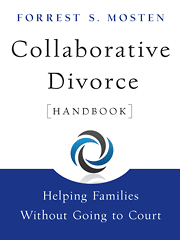 |
Collaborative Divorce Handbook:
Effectively Helping Divorcing Families
Without Going to Court
by Forrest S. Mosten
2009, Jossey Bass

|
 The Collaborative Divorce Handbook is the definitive practical resource for the burgeoning collaborative divorce movement. Up-to-date and accessible, the book is designed to give an explanation and overview of the models of collaborative divorce practice, put these models into context with other dispute resolution options, and provide readers with basic skills, practice tools, and strategies to either make an informed choice about becoming a collaborative professional (either exclusively or in tandem with other professional services) or increase the profitability of an established collaborative practice.
The Collaborative Divorce Handbook is the definitive practical resource for the burgeoning collaborative divorce movement. Up-to-date and accessible, the book is designed to give an explanation and overview of the models of collaborative divorce practice, put these models into context with other dispute resolution options, and provide readers with basic skills, practice tools, and strategies to either make an informed choice about becoming a collaborative professional (either exclusively or in tandem with other professional services) or increase the profitability of an established collaborative practice.
Contributors to Collaborative Divorce Handbook include: Pauline Tesler, David Hoffman, Stu Webb, Nancy Cameron. See A Full List of Contributors and the Titles of their “Voices”
Reviews for Collaborative Divorce Handbook
“The Handbook is a valuable resource for relatively new and intermediate practitioners of collaborative law as well as those who are considering involvement in the collaborative process, whether or not an attorney. For the beginning to intermediate practitioner, the Handbook will enhance skills and provide in-depth and practical consideration of issues presented by the collaborative process. For such practitioners, it is a worthwhile acquisition for your library.”
Margaret R. Kerouac, Esq.
ABA Section of Litigation (2011)
Read complete review here
Listen to the Voices of the Collaborative Community and Read the Full Contributions from Recognized Collaborative Professionals 
Prominent Scholars, Lawyers, Mental Health Professionals, and Mediators who offer critical praise for Collaborative Divorce Handbook include Professor Frank Sander of Harvard Law School and mediation pioneer, Harry Tindall, key architect of the Uniform Collaborative Act from Texas, Professor Constance Ahrons of University of California and author of The Good Divorce, Len Jacoby, Founder of US most successful Legal Clinic, Talia Katz, Executive Director of International Academy of Collaborative Professionals, Professor Marsha Klein Pruitt of Smith College and Author of Divorce Advisor, and Garrett Daily, Recognized Family Lawyer and President of Lawyer’s Briefcase.
Collaborative Divorce Handbook Outline
The book is organized into four basic parts:
Part One:
Explains the collaborative divorce practice in terms familiar to professionals who practice or have been educated and trained in more traditional divorce practice and are interested in representing one side of a dispute in a less adversarial manner.
Part Two:
Provides fresh and detailed insights and workable models on how mediators and collaborative practice professionals can work together and how interdisciplinary teamwork can be maximized.
Part Three:
Shares a toolbox of collaborative negotiation strategies to build agreements as well as detailed information on insuring informed consent and best practices throughout the collaborative process.
Part Four:
Offers practice and marketing strategies and resources that most professionals find useful, including sample forms and letters, checklists, and surveys. Each chapter contains “voices” from the collaborative community featuring contributions from successful collaborative professionals worldwide.
Table of Contents
- Preface
- Chapter 1: A Paradigm Shift from Adversarial to a Collaborative Perspective
- Chapter 2: Collaborative Divorce: What It Is and How It Works
- Chapter 3: How Collaborative Divorce Works with Mediation and Unbundled Legal Services
- Chapter 4: Toolbox of Strategies for Collaborative Agreement Making
- Chapter 5: The Interdisciplinary Approach of Collaborative Divorce Practice
- Chapter 6: Informed Consent and Other Best Practices to Ensure Competence
- Chapter 7: Making Collaborative Divorce Practice Your Day Job
- Chapter 8: Building a Profitable Collaborative Practice
- Chapter 9: Walking the Collaborative Walk: Taking Twenty-Five Steps Toward Peacemaking
- Glossary
- Appendix A: Books and Online Resources
- Appendix B: Resources on Collaborative Divorce Handbook Web Site
- Bibliography
- About the Author
- About the Contributors
Endorsements for Collaborative Divorce Handbook (Jossey Bass, 2010)
“Woody Mosten’s new book brings the “how-to” of collaborative divorce squarely up-to-date and perhaps most importantly, brings to collaborative practice the legitimacy of the imprimatur of an established, vastly experienced and well-regarded conflict resolution practitioner.”
Julie Macfarlane
Family Court Review, Volume 48, Number 3, July 2010
“Collaborative Divorce Handbook provides a step-by-step guide to the concepts, tools, and strategies needed to enter or improve upon collaborative practice. But, more significantly, Mosten’s test provides a compelling call to re-center legal practice around the client.”
J. Herbie Difonzo
Family Law Quarterly, Volume 44, Number 1, Spring 2010
There are many roads to peace. Whether you engage in Collaborative Practice, which by definition includes the provision that professionals will not represent the parties in litigation, or some other process for respectful conflict resolution, you will find The Collaborative Divorce Handbook to be an invaluable resource for deepening your understanding and enhancing your skills as a peacemaker.
Talia L. Katz, JD
Executive Director
International Academy of Collaborative Professionals
Collaborative lawyering is a promising new way of resolving disputes through joint problem solving rather than adversary litigation that has particular appeal for divorce cases. Whether you are a client who seeks to learn more about it or a lawyer using it who desires a wise guiding hand this book is an invaluable resource.
Frank E.A. Sander, Bussey Professor Emeritus
Harvard Law School
Written by one of the innovator thinkers in the field, this Handbook is a treasure of information for all professionals interested in Collaborative Divorce. Easy to read, expansive and chocked full of resources, it is bound to become a classic.
Constance Ahrons, Ph.D.
author, The Good Divorce and We're Still Family
Forrest Mosten’s Collaborative Divorce Handbook should be the first book any collaborative professional buys. In clear reading style, the author takes the reader through the beliefs and practice of collaborative divorce and also provides the reader with an outstanding bibliography.
Harry Tindall, Collaborative Family Lawyer
Member of Academy of Matrimonial Lawyers , Houston, TX.
Author of the first collaborative law enacted in the USA (Texas) and
Member of Drafting Committee of Uniform Collaborative Law Act
Since starting his legal career as a founding partner of Jacoby & Meyers in 1972, Woody Mosten has been a pioneer in making the legal system more accessible to the average person. His book on Collaborative Practice will be an invaluable training resource for our lawyers and clients.
Len Jacoby, Senior Partner, Jacoby & Meyers
Family Law is changing. As more people realize that the adversarial process is expensive, degrading, and stressful they look for alternatives and find it in various forms of Alternative Dispute Resolution. Woody Mosten is the nationally recognized leader of this movement and his book on Collaborative practice literally will be “The Handbook” we will all follow.
Garrett C. Dailey, Esq., CFLS, AAML
President, Attorney’s BriefCase, Inc.
In his latest book, Mosten proves not only that he is in a class of his own in terms of his knowledge and experience about collaborative divorce practice. He addresses practice and procedural issues primarily from a lawyer’s perspective, but he does not shirk the issues germane to mental health or financial professionals. Most important, the value he places on peacemaking and family healing set a tone that pervades each chapter, leading the reader toward a higher form of practice that will ultimately benefit individual clients and the entire family.
Marsha Kline Pruett, Ph.D., M.S.L.
Maconda Brown O'Connor Professor
Smith College & School for Social Work
Voices from the Collaborative Community
The following collaborative professionals from different professional backgrounds, different cultures and nationalities, and different practice styles offer their insights and experiences from their collaborative offices.
Listen to the Voices of the Collaborative Community and Read the Full Contributions from Recognized Collaborative Professionals 
Sherrie R. Abney, Attorney, Dallas, Texas:
“Collaborative Practice is perfect for Nonfamily Disputes”
Maria Alba-Fisch, Psychologist, Mt. Kisco, New York:
“The Multidisciplinary Collaborative Divorce Process Offers a Place for Each Member of the Family”
David Allison, Attorney, London, England:
“England’s Resolution Promotes Child-Focused Solutions”
Nancy Cameron, Attorney, Vancouver, British Columbia, Canada:
“Being Present”
Anne Dick, Attorney, Glasgow, Scotland:
“A Voice from Scotland”
Martin Engel, Attorney, Munich, Germany:
“Keeping Parties at the Table”
Charlotte Friedman, Family Consultant, London, England:
“Renegotiating the Parenting Relationship”
Susan Gamache, Psychologist, Vancouver, British Columbia, Canada:
“Transformation: The Full Promise and Final Frontier of Collaborative Practice”
Frederick J. Glassman, Attorney, Los Angeles, California:
“Look in the Mirror, And Like What You See”
Ann C. Gushurst, Attorney, Littleton, Colorado:
“A Child of Divorce Truly Understands the Importance of Being a Collaborative Professional”
Susan A. Hansen, Attorney, Milwaukee, Wisconsin:
“Collaborative Practice: A Challenging and Satisfying Blend of Passion, Resonance of Personal Values, And Teamwork”
Sarah E. Hilmer, Attorney, Hong Kong:
“Collaborative Practice from a Hong Kong Perspective”
David Hoffman, Attorney, Boston, Massachusetts:
“The Joy of Collaboration”
James Hynes, Psychologist, Paris, France:
“The Clients Are on Center Stage”
Christophe Imhoos, Attorney, Geneva, Switzerland:
“Cross-Border DisputesAre the Future of Collaborative Practice”
Michal Kaempfer, Attorney, Raanana, Israel:
“Collaborative Practice Makes ‘Alia’ to Israel”
Lorraine Lopich, Attorney, Sydney, Australia:
“Collaborative Practice Is a Perfect Fit for Australia’s New Family Law System”
Robert Lopich, Attorney, Sydney, Australia:
“Business Needs the Collaborative Approach”
Mary Elizabeth Lund, Psychologist, Los Angeles, California:
“Growing Up Professionally in Collaborative Practice”
Stephanie Maloney and Jerry Cohen, Financial Planners, Los Angeles, California:
“Collaborative Financial Professionals Can Lessen Clients’ Fears and Increase Their Confidence to Make Better Decisions”
Steve McBride, Financial Planner, Denver, Colorado:
“The Challenge for Divorcing Parties of Speaking Directly with Each Other Is Worth the Reduced Damage to the Family”
David R. Murch, Attorney, Webster, New York:
“Collaborative Process Is a Learning Conversation among Equals”
Kathleen M. O’Connor, Attorney, Pasadena, California:
“This Is Your Family; You Need to Care for It”
Ronald D. Ousky, Attorney, Edina, Minnesota:
“I Have Limited My Practice to Mediation and Collaborative Divorce”
James Pirrie, Attorney, London, England:
“Litigation Will Soon Be Viewed as the Stranger Alternative to Resolve Family Disputes”
Carl Michael Rossi, Divorce Coach and Attorney, Chicago, Illinois:
“A Paradigm Shift Is Required in Which We Become Aware of and Then Change Our Fundamental Beliefs about Conflict”
Melvin Rubin, Attorney, Coral Gables, Florida:
“Collaborative Divorce Has Provided Me another Alternative Work Style and Process in My Tool Kit”
Friedrich Schwarzinger, Attorney, Vienna, Austria:
“Lawyers Are Released From the Role of Client Rescuer to Become a Client Mentor”
Richard W. Shields, Attorney, Ontario, Canada:
“The Paradigm Shift and Transformation”
Darcy A. Shoop, Attorney, Rockville, Maryland:
“A Collaborative Heart Leads to Client Appreciation”
Ruth Smallacombe, Family Consultant, England:
“The Reality of an Amicable Divorce Is Far More Challenging Than the Idea”
Joe Spirito, Attorney, Torrance, California:
“Clients Fly the Plane; Attorneys And Other Professionals Are the Navigators.”
Pauline H. Tesler, Attorney, Mill Valley, California:
“The Transformative Nature of Collaborative Team Practice”
Norma Levine Trusch, Attorney, Houston, Texas:
“Love of Collaborative Practice Has Delayed My Retirement”
Stu Webb, Attorney, Minneapolis, Minnesota:
“Collaborative Practice Started With ‘Four Settlement-Only’ Lawyers in Minneapolis”
Amy Whitlatch, Financial Planner, Cincinnati, Ohio:
“Collaborative Financial Professional: A Love of Detail and a Willingness to See Both Sides”
Freda Wigan, Attorney, Brisbane, Australia:
“The Opportunity to Work with Other Colleagues under the Collaborative Banner Provides a Welcomed Relief from an Otherwise Stress-Fueled and Highly Emotive Career”